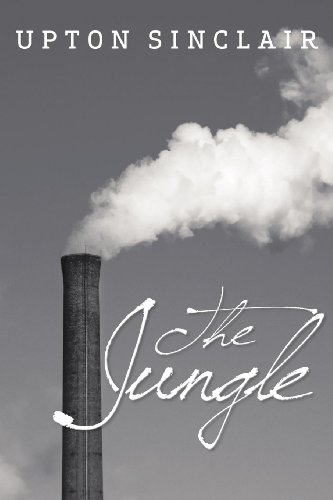All Nonfiction
- Bullying
- Books
- Academic
- Author Interviews
- Celebrity interviews
- College Articles
- College Essays
- Educator of the Year
- Heroes
- Interviews
- Memoir
- Personal Experience
- Sports
- Travel & Culture
All Opinions
- Bullying
- Current Events / Politics
- Discrimination
- Drugs / Alcohol / Smoking
- Entertainment / Celebrities
- Environment
- Love / Relationships
- Movies / Music / TV
- Pop Culture / Trends
- School / College
- Social Issues / Civics
- Spirituality / Religion
- Sports / Hobbies
All Hot Topics
- Bullying
- Community Service
- Environment
- Health
- Letters to the Editor
- Pride & Prejudice
- What Matters
- Back
Summer Guide
- Program Links
- Program Reviews
- Back
College Guide
- College Links
- College Reviews
- College Essays
- College Articles
- Back
The Jungle by Upton Sinclair
“But instead of bearing it patiently, he had struck back, and struck hard. He was striking all the time – there was war between him and society.” These words, used to describe one of the story’s minor characters, capture the essence of Upton Sinclair’s The Jungle. A harsh tale of the experiences of Lithuanian immigrants in America, The Jungle was written as an expose for the utter horror of urban poverty during the Industrial Age. Jurgis’s tale of struggle immediately captured the heart of the nation, and later led President Theodore Roosevelt to pass the Federal Meat Inspection Act in 1906. A book often relegated to dusty bookshelves and reluctant summer reading assignments, The Jungle is a powerful tale of how the American struggle transcends time, whether in 1901 or 2012.
Sinclair’s story begins with the wedding reception, or veselija, of Jurgis and Ona, a young couple who, along with their families, had just immigrated to Chicago. The party is painfully festive, and despite all the dancing and feasting, Ona worries that they will not have enough money to pay for the ceremony. Jurgis, brawny and youthful, pushes her worries away, stating that he will just work harder, and everything will turn out alright.
However, as the story progresses, Jurgis’s assurance in his own strength wanes, as he is forced again and again to submit to the will of Packingtown. He, along with Ona, Marija, and the other adults, get jobs working in the factories, slaughtering cattle or painting cans. Though they manage to get by comfortably at first, disaster strikes repeatedly, bringing them to the brink of starvation. Jurgis is put in jail when he beats up Ona’s boss, who has been regularly raping her, and upon his release, finds the entire family without home or food. Later, Ona dies as she gives birth to her boss’s child.
Jurgis, distraught at the loss of his wife and child, runs away, living as a tramp in the Illinois countryside. Eventually, he returns to Packingtown, where he joins a political party and becomes part of the machine that had so carelessly destroyed him and his family. After a second attempt at revenge for Ona, Jurgis is put back in jail and yet again loses everything, but one night, after wandering into a meeting for the Socialist party, Jurgis finds himself revitalized and immediately joins the party. In the end, Jurgis is left working comfortably in a hotel, an avid believer in socialism.
Throughout the narrative, Sinclair utilizes brutal images, with blood pouring from squealing hogs in the slaughtering house or a broken and starving Jurgis begging on the street, to demonstrate the atrocities the urban poor faced. By portraying these images to the audience, he was able to effectively illustrate the contrast between the ruling elite and the common man. The Jungle, while depressing and foreboding, is a great novel, a classic that helped change America’s perceptions of its poor.
Similar Articles
JOIN THE DISCUSSION
This article has 0 comments.

